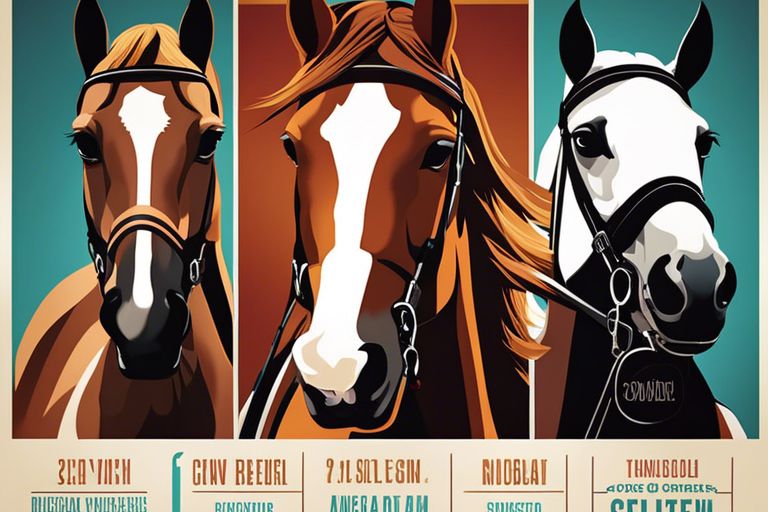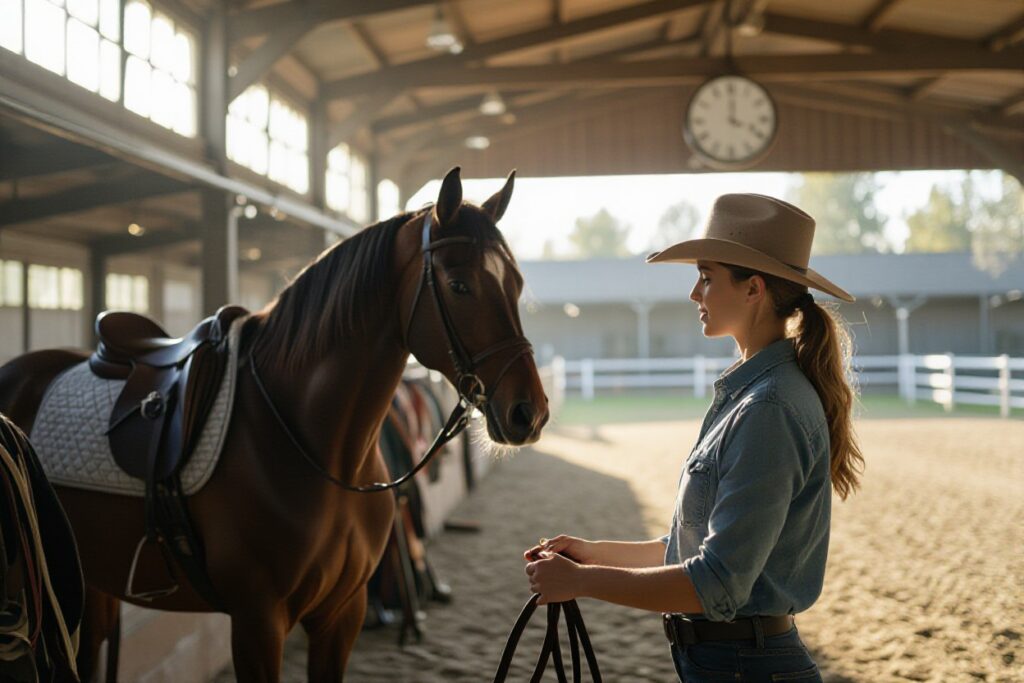Planning a horse show series can be an exciting and rewarding endeavor for you as an equestrian enthusiast. From selecting the right venues and dates to organizing classes and securing sponsors, there are many key components to consider. In this guide, you will learn the vital steps and tips to successfully plan and host a horse show series that will delight participants and spectators alike.
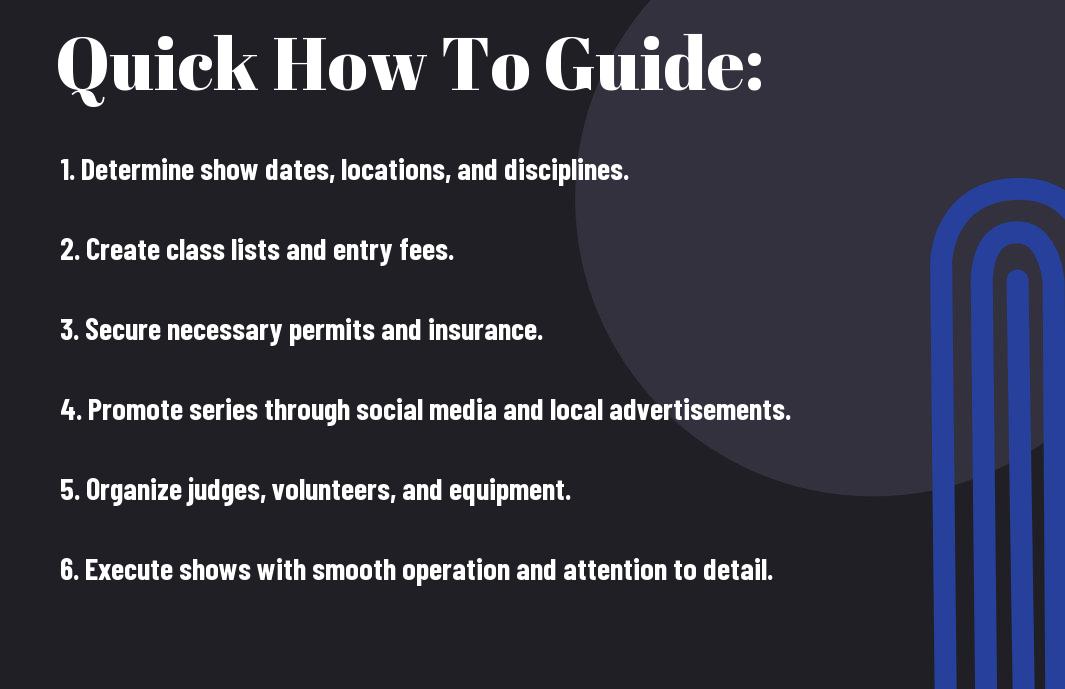
Understanding the Basics of Horse Show Planning
Defining Your Horse Show Series Goals and Objectives
While planning a horse show series, one of the first steps is to define your goals and objectives for the series. What are you hoping to achieve through these events? Are you looking to promote a specific breed or discipline? Do you want to provide a friendly and welcoming environment for riders of all levels? By clarifying your goals, you can create a roadmap for the rest of your planning process.
Identifying Your Target Audience and Participants
You need to identify your target audience and participants to ensure that your horse show series is tailored to their needs and interests. Are you aiming to attract beginner riders looking for a safe introduction to horse showing, or are you targeting more experienced competitors seeking a challenging environment? By understanding who you are targeting, you can design your events to appeal to their preferences and requirements.
Understanding the demographics, skill levels, and preferences of your target audience can help you create a competition format that will engage participants and keep them coming back for more. Consider conducting surveys or focus groups to gather feedback and insights directly from your potential participants.
Choosing the Right Venue and Dates
Factors to Consider When Selecting a Venue
In terms of choosing the right venue for your horse show series, there are several factors you should consider. Location is key – you want to choose a venue that is easily accessible for participants and spectators. The facility’s amenities are also important; make sure they have everything you need to host a successful event, such as ample parking, stabling options, and arena footing. Additionally, consider the size of the venue – it should be able to accommodate the number of entries you expect. Any restrictions or regulations imposed by the venue should also be taken into account.
Tips for Scheduling Dates that Work for Everyone
If you want to ensure a successful horse show series, it’s crucial to schedule dates that work for everyone involved. Consider factors such as the availability of key personnel (such as judges and course designers), as well as any major competing events that may conflict with your chosen dates. Communication is key – make sure to reach out to potential participants to get an idea of their availability before finalizing your schedule. This will help you avoid any last-minute conflicts. This way, you can ensure maximum participation and attendance at your horse show series.
How to Ensure Adequate Facilities and Equipment
Scheduling a horse show series requires careful consideration of the facilities and equipment available at the chosen venue. Make sure the facility has enough stalls for the number of horses expected, as well as adequate arenas for warm-up and competition. Another important factor to consider is the availability of equipment such as jump standards, poles, and dressage letters. Having everything you need on hand will help ensure a smooth and successful event.
Creating a Competition Format and Schedule
Types of Horse Show Classes and Divisions to Offer
For a successful horse show series, it’s important to offer a variety of classes and divisions to cater to different riders’ skill levels and horse disciplines. Classes can range from beginner levels to advanced, including disciplines such as hunter, jumper, equitation, and dressage. Divisions can be based on rider experience, horse age or breed, or specific riding styles.
| Format | Examples |
| Beginner | Walk-Trot classes |
| Intermediate | Low-level Jumpers |
| Advanced | Dressage Tests |
| Open | Working Hunter classes |
| Specialty | Leadline classes |
Any well-rounded horse show series should aim to provide a diverse range of classes and divisions to attract a larger pool of participants and keep the competition engaging and challenging.
How to Create a Fair and Balanced Competition Schedule
You can ensure a fair and balanced competition schedule by staggering class times appropriately to allow for smooth transitions between events. By spreading out classes throughout the day and considering factors such as warm-up times and rider overlaps, you can create a schedule that accommodates all participants and their horses.
Divisions with similar class sizes and skill levels should be scheduled at different times to avoid overcrowding in the warm-up areas and provide each competitor with ample time to prepare and perform. Avoiding back-to-back classes for riders with multiple entries can also help prevent schedule conflicts and ensure a seamless flow of the competition.
Strategies for Managing Class Sizes and Ride Times
Offer pre-registration options to monitor class sizes and make adjustments as needed to prevent overcrowding or sparse participation in certain divisions. By setting limits on entries per class or division, you can maintain a manageable number of participants and ensure a more organized and efficient competition.
With careful planning and flexibility, you can effectively manage class sizes and ride times to create a positive experience for all competitors and spectators, ultimately contributing to the overall success of your horse show series.
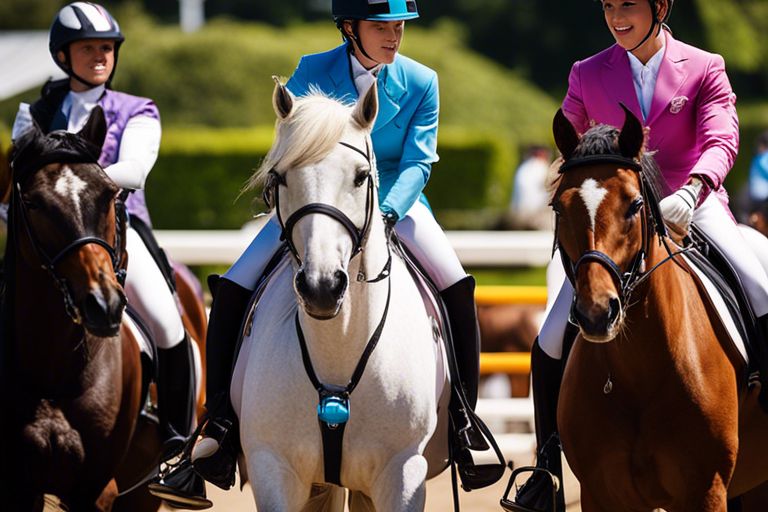
Recruiting and Managing Volunteers and Staff
Once again, when planning a horse show series, recruiting and managing volunteers and staff is crucial to the success of your event. This chapter will guide you through the process of identifying imperative roles and responsibilities, as well as providing tips for recruiting and retaining volunteers.
Identifying Essential Roles and Responsibilities
The first step in recruiting and managing volunteers and staff for your horse show series is to identify the imperative roles and responsibilities needed to run the event smoothly. Some key positions to consider include **volunteer coordinator**, **ring stewards**, **judges**, **gatekeepers**, **scorers**, and **parking attendants**. Each role plays a vital part in ensuring that the event runs efficiently and that all participants have a positive experience.
Tips for Recruiting and Retaining Volunteers
When considering recruiting and retaining volunteers for your horse show series, it’s important to make the experience rewarding and enjoyable for them. Some key tips for **recruiting and retaining volunteers** include providing clear role descriptions, offering training sessions, showing appreciation through thank you notes or small tokens of gratitude, and creating a sense of community and camaraderie among volunteers. This will not only help you attract volunteers but also keep them engaged and motivated throughout the series. This will help ensure the success of your event and build a loyal team of volunteers.
How to Train and Support Your Event Staff
Managing your event staff effectively is imperative to the smooth operation of your horse show series. From **recruiting** and **training** to **ensuring** their well-being and **supporting** them throughout the event, your staff plays a vital role in the success of your series. By providing clear guidelines, offering training sessions, and being available to address any concerns or questions, you can ensure that your staff is well-prepared and equipped to handle their responsibilities.
Understanding the importance of **effective communication** and providing **ongoing support** to your event staff can make a significant difference in how smoothly your horse show series runs. Remember to **lead by example** and **show appreciation** for their hard work and dedication. By investing time and effort into recruiting, training, and supporting your event staff, you can create a positive and **productive** environment for everyone involved.
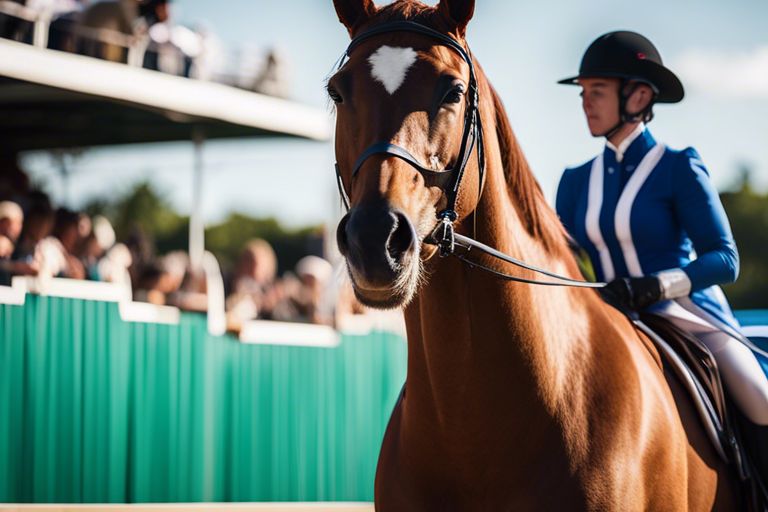
Marketing and Promoting Your Horse Show Series
After putting in all the hard work to plan your horse show series, it’s time to focus on marketing and promoting your events. This crucial step will help you attract participants, sponsors, and spectators to make your series a success.
Effective Strategies for Reaching Your Target Audience
Audience targeting is vital when it comes to marketing your horse show series. You want to ensure that you are reaching out to individuals who are interested in equestrian events. Consider partnering with local tack shops, feed stores, and equestrian clubs to help spread the word about your series. Additionally, you can create targeted ads on social media platforms to reach a broader audience.
How to Create Engaging Promotional Materials and Content
Now, when it comes to creating promotional materials for your horse show series, remember that visuals are key. High-quality photos and videos of past events can capture the attention of potential participants and spectators. You can also design eye-catching posters, flyers, and social media graphics to promote your series.
For instance, you can create teaser trailers or behind-the-scenes videos to generate excitement leading up to each event. This type of content can give your audience a glimpse of what to expect and encourage them to attend.
Utilizing Social Media and Online Channels
To maximize your reach and engagement, you should utilize social media and online channels to promote your horse show series. Platforms like Facebook, Instagram, and YouTube are great for sharing updates, posting event schedules, and showcasing highlights from previous shows. You can also consider partnering with influencers or equestrian bloggers to help amplify your message.
It is important to interact with your audience on these platforms by responding to comments, hosting giveaways, and sharing user-generated content. Do not forget, the more active and engaging you are online, the more interest you will generate for your horse show series.

Managing Logistics and Operations
Keep your horse show series running smoothly by efficiently managing logistics and operations. This involves coordinating vendors and suppliers, managing finances and budgets, and ensuring a smooth and efficient event.
Coordinating Vendors and Suppliers
Clearly communicate your needs and expectations to vendors and suppliers to ensure they can meet your requirements. Make sure to establish timelines for deliveries, set-up, and tear-down to avoid any last-minute issues. **Maintaining** good relationships with your vendors can also help in securing reliable services for future events.
Tips for Managing Horse Show Finances and Budgets
Managing your horse show finances and budgets is crucial to the success of your series. **Creating** a detailed budget that includes all expenses and projected revenue will help you stay on track financially. Make sure to track all costs accurately and consider setting aside a contingency fund for any unexpected expenses that may arise. **Regularly** reviewing your finances and adjusting your budget as needed will help you stay within your financial goals.
- Track all expenses
- Set aside a contingency fund
- Regularly review your finances
The financial aspect of your horse show series is imperative to ensure its sustainability and success. **A** well-managed budget will help you make informed decisions and allocate resources effectively. **By** carefully monitoring your finances and sticking to your budget, you can **maximize** the potential for a profitable and rewarding event series.
How to Ensure a Smooth and Efficient Event
Coordinating all aspects of your horse show series is key to ensuring a smooth and efficient event. **By** creating detailed timelines and schedules for set-up, competitions, and tear-down, you can **help** streamline operations. **Secure** reliable staff and volunteers to assist with various tasks to ensure everything runs according to plan.
Show your dedication and **hard work by** overseeing all logistics and operations carefully. **The** success of your horse show series relies heavily on your ability to coordinate and manage all aspects effectively.
Final Words
Summing up, organizing a horse show series can be a rewarding and exciting endeavor. By following the steps outlined above, you can effectively plan and execute a successful series that participants and spectators will enjoy. Remember to set clear goals, create a budget, secure appropriate venues, establish a schedule, promote your events, and ensure that all logistical details are taken care of. With careful planning and attention to detail, your horse show series is sure to be a hit!
Q: What is a horse show series?
A: A horse show series is a sequence of horse shows that are linked together, usually held over a specified period of time, where competitors accumulate points or prizes based on their performance in each show.
Q: How do I plan a horse show series?
A: To plan a horse show series, you should start by setting a schedule for the shows, determining the classes and divisions offered, securing a venue and necessary permits, establishing a budget, promoting the series to attract participants, and organizing staff and volunteers to help run the events smoothly.
Q: What are the benefits of participating in a horse show series?
A: Participating in a horse show series allows riders and horses to gain valuable experience, compete against a consistent group of competitors, track progress and improvement over time, and potentially qualify for year-end awards or championships.
How can I attract sponsors for my horse show series?
To attract sponsors for your horse show series, you can offer various sponsorship packages with benefits such as logo placement on marketing materials, naming rights for specific classes or divisions, vendor booth space at the shows, social media promotion, and recognition during award ceremonies.
Q: What should I consider when selecting judges for a horse show series?
A: When identifying judges for a horse show series, consider their experience and credentials in judging the specific disciplines or classes offered, their reputation within the equestrian community, their availability for all shows in the series, and their ability to provide fair and consistent evaluations for all competitors.
